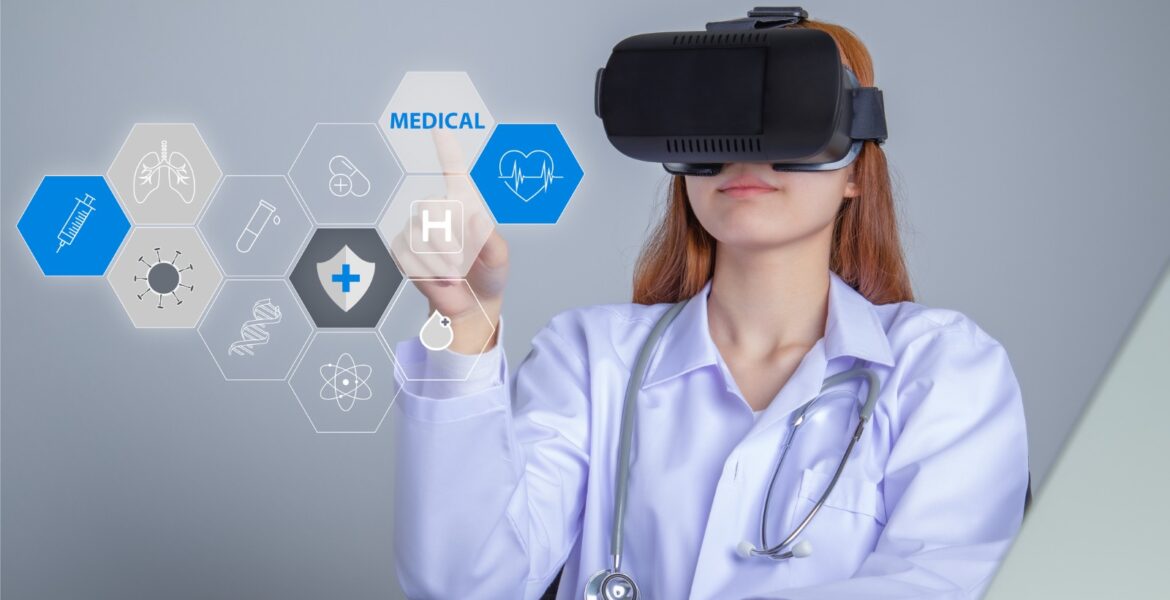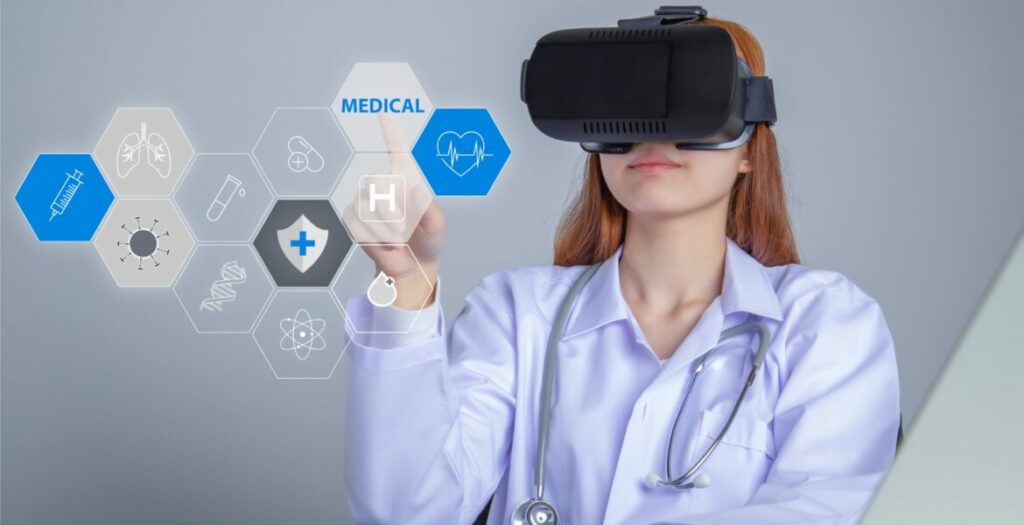The methods used to diagnose and treat patients are evolving in the time in which we live. Who would have believed ten years ago that a doctor could assist patients remotely via the metaverse? The development of the healthcare metaverse has made it simpler for medical professionals to care for their patients throughout the world and alleviate them of the agony brought on by serious illnesses.
Augmented reality (AR), virtual reality (VR), robotics, quantum computing, blockchain, and artificial intelligence (AI) all contribute to the creation of interconnected virtual environments that support immersive and interactive experiences for both patients and doctors.
Healthcare metaverse development is now gaining ground quickly. It would be accurate to state that the healthcare sector can now combine technology and medications to treat patients more successfully. It has opened up new avenues for treating patients remotely, at a lesser cost, and without having to make them endure more suffering by requiring them to go to the hospital in person. Without leaving their comfort zones, they can participate in telepresence. It certainly is a big relief. In addition to AR/VR and AI technology, digital twinning makes it all feasible.
The medical metaverse is no longer a made-up world. A doctor from another country can now be contacted at home using a laptop or computer thanks to a new version of the internet. Hospitals and patients can both benefit from technological advancements in healthcare metaverse development. It makes sense that the metaverse in healthcare trend will skyrocket during the next few years. The global healthcare metaverse market will reach 205 billion in 2034 from its current value of 8.7 billion in 2024.
Impact of Metaverse on Healthcare Sector
Let’s examine how a blockchain-based metaverse can change how healthcare organisations operate.
1. Improved Data Management with Strong Security
All of the medical and transactional records can be safely saved in blockchain, which is nothing more than a distributed ledger or a collection of encrypted databases. There is no way to tamper with the records kept on the blockchain. In addition, it makes it simpler to immediately share vital information with many organisations, which simplifies the treatment processes.
2. Fast and Simple Payments using Smart Contracts
With the growth of the healthcare metaverse, the use of blockchain-based smart contracts makes it easier to collect or reimburse payments from patients for the services they get. The best aspect is that, aside from the gate fees for the blockchain and the costs associated with the virtual hospital, all worldwide transactions may be completed in a matter of seconds.
3. Online clinics
Patients can visit virtual hospitals and consult with doctors thanks to Metaverse in Healthcare. Receiving (remote) physiotherapy counselling may also be beneficial.
4. Training and Education
The metaverse can assist in removing physical boundaries and making it easier for healthcare personnel to get instruction and training from specialists remotely. It will be simpler for them to periodically refresh their knowledge base as a result. Wouldn’t it be amazing to improve one’s skills with the assistance of foreign experts without having to leave the city? Only scientific advancements in metaverse development have made it conceivable.
5. Pre- and postnatal care
Due to the rigorous lockdown and the high patient volume in the hospitals during the Covid-19 pandemic, it was difficult for pregnant women to access healthcare facilities. As a result, the hospitals offered online consultations to women. The creators of the metaverse have come up with a simple solution to these issues and have been assisting medical professionals in giving prenatal and postpartum advice to the metaverse’s pregnant residents.
6. Fitness and Nutrition
Metaverse Healthcare can be useful in motivating people to adopt healthy eating practises. A dietitian can go over the importance of eating the right foods and pursuing a healthy lifestyle. It will make it simpler for regular people to recuperate their vital energy after a protracted illness or in other situations.
7. Exercising and Tiredness
There are many of sluggish folks who don’t enjoy going for early walks or prefer going to the gym. Healthcare metaverse development experts can create for them a unique virtual environment where they can enjoy exercising as digital avatars. For individuals who need to get fit and move more, it can be a good endeavour.
8. Psychiatry
Today, there are a growing number of people dealing with mental illnesses such schizophrenia, bipolar disorder, anxiety, and depression. Such patients, who require attendants to accompany them to the hospital, can benefit greatly from the care provided by metaverse hospitals. Attending the counselling sessions is convenient for everyone, including the patient, the patient’s family, and the doctor.
9. Team-based procedures
Famous doctors and surgeons have the ability to direct the local medical staff in doing minor and big surgeries without a doubt thanks to the healthcare metaverse. Neurosurgeons at John Hopkins recently removed a tumour from a patient’s spine using the AR method. It won’t be shocking if the average person can pay for a family member to have surgery inside the metaverse.
10. Telemedicine
Medical professionals may have more options to provide their patients telemedicine thanks to the metaverse. They will be able to reduce their risk of spreading infectious diseases as a result.
Final Reflections
The term “healthcare metaverse” is currently popular. As a result, an increasing number of healthcare providers are enthusiastically attempting to incorporate metaverse in healthcare and improve their level of service.



1 thought on “The Impact of Metaverse on the Healthcare Sector”